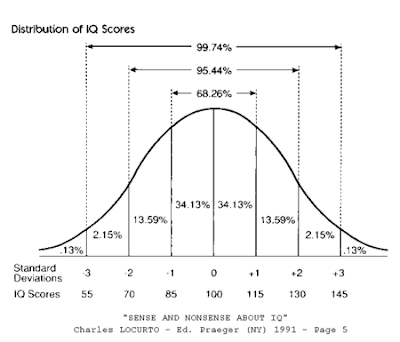David Shenk has a great FAQ on IQ, explaining both what IQ is and what it isn't. Here are a few insights:
- Almost all human beings, of course, learn tremendously and grow in their skills over time, even if their academic ranking doesn't much change.
- Nothing about I.Q. implies any sort of inherent limit, or "ceiling," on the human ability to learn. I.Q simply shows that, as groups grow intellectually, they tend to grow at the same rates. Better schools can raise the level of learning for nearly all students.
- Any individual can buck a trend, and individuals' I.Q. scores have been known to change as much as 18 points over time (Jones & Bayley, 1941).
- Most importantly, perhaps, I.Q. only measures academic intelligence, missing entirely other types of intelligence.
Additionally:
- I.Q. scores have a weak correlation with nonacademic intelligence and with performance in everyday tasks in other cultures. (Miller, p. 292).
- I.Q. scores do not identify the most successful and creative artists or scientists (Taylor, 1975, pp.1-36).
- Brazilian street children who have failed math in school can still be savvy in street trades -- they use methods altogether different from pencil-and-paper math. (Carraher, Carraher, and Schliemann, 1985). (Similar results with California shoppers (Lave, 1988) and harness race wagerers (Ceci and Liker, 1986)
- I.Q. does not distinguish the best chess players from others... (Doll & Mayr, 1987)

We discussed IQ extensively in my micro class. While I don't disagree with any of the empirical findings relating to this research, I'm uncomfortable with the conclusions many people draw from them. IQ matters for how quickly you can process information and possibly how quickly you learn, but I haven't seen any data implying that this means hgh-IQ people make better decisions than anyone else.
People with high IQ may be better at performing mathematical calculations, but that doesn't automatically make them more successful at navigating other areas of life. I believe it's possible having a high IQ may bias individuals towards believing their thinking is superior to others leading them to undervalue the opinions and thoughts of others. That can lead to disastorous consequences in relationships and, if they are in power, in politics as well. I recently saw a documentary on Milton Friedman in which he discussed the differences between Nixon and Reagan. Friedman said Nixon was definitely the smarter of the two, but that Reagan had much stronger principles. Friedman respected Reagan much more and you can see who of the two had a more successful presidency.
As I wrote in a previous post:
If we need more intelligent people making choices for us, why not trust them to tell us what cars to buy, what clothes to wear, who to marry, what items we're allowed to buy from the grocery store and where we can live? Surely many of these things matter just as much to our overall well-being as health care. (I can live longer without going to the doctor than I can without eating. Why no clamoring to stop the ignorant masses from shopping at the grocery store?)
These issues all highlight something Hayek called the knowledge problem. No one knows better than you how to spend your money, what priorities you have in life, the goals you want to accomplish or how much you value things like food, health and happiness. There is no exceptional level of intelligence needed to make decisions on these things. Hayek once observed that one of the problems with intelligent people is that they tend to overvalue intelligence. These words ring very true!
The good news for all of us is that we have tremendous potential to improve our performance in areas of life and skills that we devote time and energy to practice.
Fabio Rojas also picks up on this meme and writes:
The organization that has best absorbed this lesson? I’d vote for the Marines. Ever talk to a Marine trainer? The idea is pretty simple. Conditional on basic health and psychological fitness, any person can become an expert in hand to hand combat, sharp shooting and survival skills. Not just the jocks in high school - even the posers, the metal heads and the nerds. If you ever read accounts of Marine training, such as Thomas Ricks’ Making the Corps, you quickly realize that the organization’s assumption is that any willing person can be made into a killing machine. It’s a lesson, with qualifications, that can be better absorbed in other areas of life.
If it works for the Marines, shouldn't it also work for any organization or individual? There doesn't seem to be any "magic cap" on our ability to improve or to learn. I don't know about you, but I find that encouraging news indeed!
See My Previous Posts:
No comments:
Post a Comment